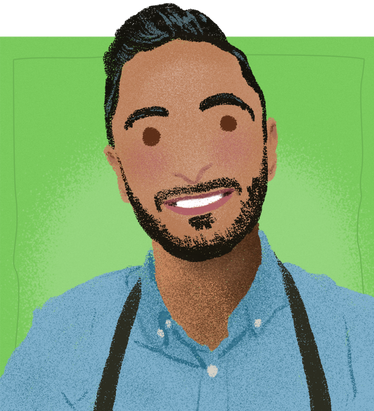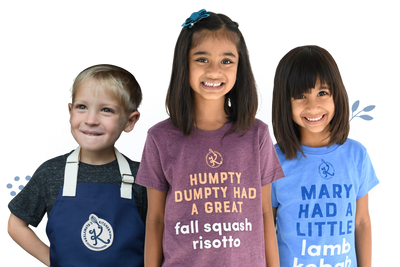
Taste Bud Profile
Behzad Jamshidi

My conversation with Chef Behzad was sheer joy! He has so much energy and enthusiasm for his vision, and it is absolutely infectious. We spoke at length about similarities in our lives in realizing the great privilege of our cultural identities, and how we should be the ones to celebrate and educate around them instead of being defined by an outside gaze. We just managed to miss each other during our tenures at Le Bernardin, but it is always so fun to see how that place has inspired and encouraged so many people I admire in the industry.



Behzad Jamshidi: My very first food memory is of my mom and my aunt rolling and making sambooseh in our family restaurant. It’s like Indian samosa, which is I think what most people think of first when they hear it, but in Farsi we call it Sambooseh, and it is a food that has exemplified the spread of Persian influence on food throughout countries like Iraq, Lebanon, Tunisia, India, and Pakistan. Anyway—I remember them making it, and wanting to be involved. Having your hands involved in the process of creating something fundamentally makes it better. I was young when I started cooking at the restaurant to help out—but even before that, I remember trying to pitch in by chopping parsley in the corner, getting bread ready for sandwiches, little things. It was a very subtle, easy integration into the process of making food throughout my childhood. I can remember the first time I formed a falafel in my hand, and the first time I fried one. I remember also watching my parents flip a tahdig, that beautiful crispy rice at the bottom of the pot. As Iranians, our culture is so deeply centered around food, and having people at the dinner table. If we say we have a few friends coming over, we mean we have 50 mouths to feed on a Tuesday. That’s just what we do.
Abundance is not just about an amount of food—it’s about the people coming together to share it. So I suppose my first memories around food are really instinctive—that there was always something more to it than just the food.

Le Bernardin was the first restaurant to really win my heart. When I was 9 or 10, I saw Eric Ripert in a magazine, and from that point on I was obsessed with New York. I begged for a cheap New York skyline print to hang in my room, and this little New York fire just burned in me my whole childhood. When I turned 17, I finally went to NYC. I got a trial with Le Bernardin, and I spent two days back to back as a trial, and was offered a job there. One night when I was cleaning geoducks during a Saturday service, Anthony Bourdain rolled through the kitchen. He asked me where I was from, I told him I was from Iran, and he asked what I was doing at Le Bernardin. I told him that I was there to learn French technique, and to apply what I learned there to my career because I believed it to be fundamental. I went on and on about wanting to work at L’Arpege, learn vegetable cookery, and he said to me “you don’t need to do that. Do you know how many cooks are in this kitchen to cook French food? More than enough. You should cook your food. That’s fundamental. That’s really special.” We talked about Iran, and I was so proud when he eventually recorded an episode of Parts Unknown there. He had such a profound impact on me in such a short period of time.
To be honest I was mad at my own culture at the time. How could food be so fundamental to our home lives, but command no respect as a career? This is one of the reasons Iranian culture is not shared as widely as many others through food—the idea of making it one’s career is not respected in the culture the same way it is in others.
So I never considered Iranian food as the avenue through which I could express myself. Bourdain made me see it differently. I started to feel like I had something unique to offer, and I felt empowered to make suggestions at the restaurant—like how to sauté barberries, how to blanch the rice the way the Persians do it. There was something that opened up in me when I realized this. I realized that I don’t have to cook French food, or apply French techniques. I could tell my story now, and in doing so I could break the ice for other people to explore their own. That’s what it’s all about for me now.
There’s a lot to talk about when we talk about appropriation and authenticity. As a kid, school lunches were hard. I remember inherently knowing that my food was so delicious, but feeling like it was impossible to actually enjoy myself at school when eating it.

Think about this—when we were young, if you were the kid who brought Onigiri or Gimbap to school but somebody else brought Lunchables—the kid who brought their own food felt like they had to throw it out or hide it, and we all communed and ogled the putrid tomato sauce and bad cracker and meat-product combination, like this was normal and even “better” than other food. And that’s insane. It’s very literally appropriation, because it’s stealing the possibility of actually enjoying good food and putting it beneath this processed stuff in a hierarchy of “good”. I want that dialogue to change. Think of all the kids whose enjoyment was stolen from them. I grew up in Canada, and I know that racism was a different kind than experienced by many in the United States. But even with a generally more diverse society and school, I remember kids from non-white cultures having to suffocate parts of themselves in order to fit in. I want to change this dialogue to make kids see that it is a privilege to be unique. It is a real privilege around food to have something to share, to contribute, to celebrate. I want people to stop buying into the idea that alphabet soup is somehow better than dal.
I’m participating in a lot of dialogue for adults that aims to explore and understand how appropriation and the idea of authenticity has shaped us, and how we can change things.
One dish I make that I think perfectly encapsulates it all is Ghormeh Sabzi—it’s the mother of all Persian stews. We take a myriad of herbs—cilantro, parsley, fenugreek, garlic, chive—stew it down and let it braise with lamb, Persian black lime, and kidney beans. It’s super hearty and very special, and I grew up eating it. My parents fled the revolution in Iran to make our lives in Canada. They’re super ‘traditional’—but they also raised Canadian kids. Here’s a real life immigrant food story— when we had this very traditional stew, we also always had a bottle of Frank’s Red Hot on the table. We all loved it, and honestly it made the stew better. When I serve this dish now at panels or dinners, I always include a little bottle of Frank’s on the side. This is actual authenticity—putting the guest at the table where an actual Iranian chef and immigrant grew up, not someone else’s idea of the ‘true Iranian’ dinner table, whatever that means. This is a representation of who I actually am—not just an Iranian identity, but the evolution of it with my Canadian identity as well. I don’t think enough of those immigrant stories are shared because it’s all about someone else’s opinion of what is ‘real’ Iranian or Indian or whatever other food.
People have different experiences and have evolved the culture in different ways. We should get to talk about all of it, not just one ‘true’ lens. That doesn’t take away from the narrative of a culture, it enriches it!
I encourage everybody to share their dinner table, and to take a seat at the dinner tables of others.
Around shared meals, we have the opportunity to realize that there is more in common, and more to celebrate, than anything else. It’s what Anthony Bourdain did his entire career—show us that in some magical way, talking about anything difficult is just easier over a shared meal.

